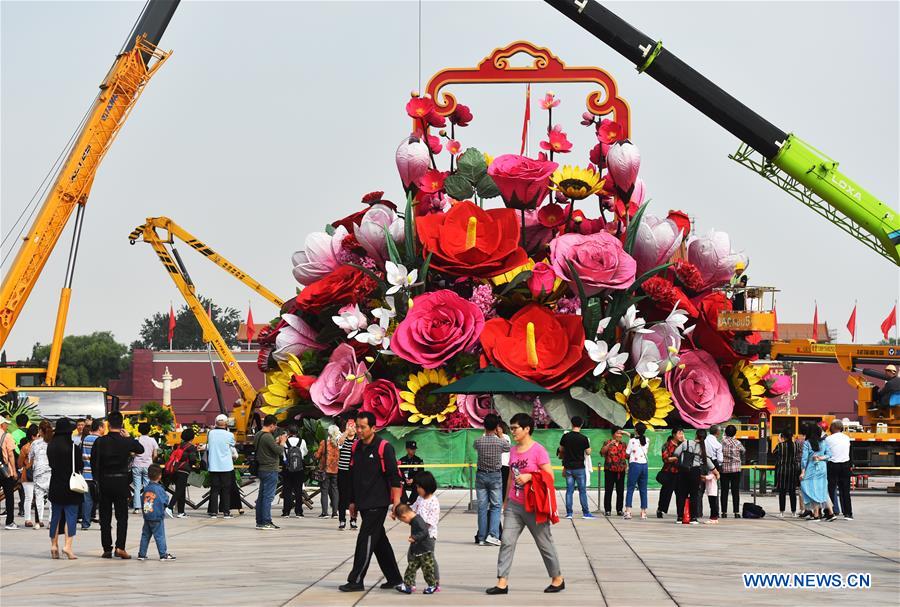Ways to beat the crowds during China's National Holiday
- By Ember Swift
 0 Comment(s)
0 Comment(s) Print
Print E-mail China.org.cn, September 30, 2018
E-mail China.org.cn, September 30, 2018

China's National Day holiday, which also marks the 69th year of the start of the Central People's Government, is coming up on October 1. This week-long national holiday is what Chinese people lovingly call "Golden Week," and as you may have guessed, "golden" refers to the changing color of the leaves as autumn approaches. The National Day holiday generally falls in and around "bayue shiwu" or the 15th day of the 8th lunar month, otherwise known as the Mid-Autumn Festival, a time for celebrating harvest and expressing gratitude.
The canopy of golden leaves that nature paints upon the mountainous hillsides surrounding Beijing, (not to mention the respite from work) draws tourists from all over China to Beijing to enjoy the various scenic spots the capital city has to offer. Sites like Fragrant Mountain (Xiang Shan), the Summer Place (Yi He Yuan) and the Great Wall with its many picturesque renovated sections for visitors (Mutianyu among the favorites), are jam-packed with visitors during the National Day holidays.
How can a tourist best enjoy this week-long vacation? The Golden Week holiday is when everyone is off work and can afford the time to travel, but this also means tourist sites are far too crowded to enjoy, let alone fully absorb. It's hard to be invigorated whilst hiking up a mountain, for instance, when the slowest group of tourists is setting the pace on crowded pathway steps. Taking a nice photo of the beautiful autumn leaves along the Summer Palace lake is also very difficult when numerous other cameras are vying for the same angle and invading your shot.
There are, however, other options. If one examines what being a tourist during the National Day holidays truly means, it becomes possible to think outside the box. Perhaps people have no other time in the year to visit some of these tourist sites, but have they thought of other ways to see them rather than using the standard approach of queuing up in the early hours of the morning for an entrance ticket?
How about considering a trip to the Great Wall at a location that isn't renovated for tourists? Instead of going to the usual Badaling and Mutianyu parts of the Great Wall, tourists can venture to parts of the "wild wall." These are parts which showcase ruins of the Great Wall, but where turrets and guard houses still stand upon the spine of the mountain ridges. Nature has engulfed these parts of the "wild wall," and vines, ancient trees and even a dash of man-made graffiti can be seen covering the ruins.
Another suggestion is to visit some of these places toward the end of the day. Many tourists start very early in the day and are the first through the gates, but few arrive to explore the sites in the late afternoon or early evening. This time of day will be a lot more peaceful and visitors won't have to elbow their way through the crowds to enjoy the scenic spots.
But if one simply cannot avoid the throngs of tourists, it's vital to be aware of the unspoken "rules" of Chinese crowds. Being too polite won't get one anywhere in China, and it certainly won't get one a good view or a nice angle for a photograph. A little elbowing (along with a large dose of patience for being elbowed) are all aspects of being a tourist in China with which Chinese tourists are long acquainted with. Shoving or vying for space when it's offered is not considered immature or impolite; it is simply a method of survival in an over-populated country that still has a collective holiday schedule! When foreigners in China decide to hold a door open for a person walking in the opposite direction, for instance, one should not be surprised if ten people follow the first person until it becomes simply impossible not to wedge yourself in the endless stream of people just to get to where you want! In China, space is precious and that includes space in places with heavy foot traffic.
Nevertheless, the National Day Holiday is a special time for outdoor fun as Beijing's oppressive summer heat dissipates into the gentle coolness of autumn.
Enjoy your National Day Holiday. May your week be truly golden!
The author is a columnist with China.org.cn. For more information please visit:
http://m.keyanhelp.cn/opinion/emberswift.htm
Opinion articles reflect the views of their authors, not necessarily those of China.org.cn.





